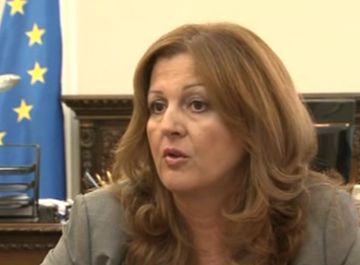Q:
A:
Continuation of dialogue, implementation of agreements reached with Pristina await Serbia
Belgrade,
16 August 2012
Deputy Prime Minister for European Integration Suzana Grubjesic today stated that no new difficult conditions will be imposed on Serbia in order to step up EU integration, but that all agreements reached with Pristina must be implemented.
Grubjesic told Tanjug news agency in an interview that difficult talks are ahead when the dialogue resumes, adding that it will not be easy to implement all that has been agreed, or to prepare a platform for dialogue at the highest political level.
These are very complex tasks, she said, adding that telecommunications and energy are two issues that were left incomplete in the previous technical dialogue, while the political dialogue will be led by the highest Serbian political representatives, led by the President.
Grubjesic stressed that the entire negotiating process should be transparent and that Serbian citizens must be acquainted with what has been agreed and what the implementation of these agreements implies.
Asked which agreement will be the most difficult to implement, she replied that none of them are easy.
She also added that talks on telecommunications and energy are still ahead of us, and talks on these issues will also be demanding, especially in terms of energy, because this issue concerns resources and property.
Grubjesic reiterated that all agreements already reached with Pristina must be implemented because any other solution would bring down the credibility of this government.
She rejected any possibility that the implementation of the agreements may lead to a recognition of independence of Kosovo-Metohija.
Both we and the previous government have underlined that there will be no recognition of the province’s independence. It is pointless to look for nuances of what is implicit, explicit, indirect or direct, because we all know what recognition is and the lines here were drawn long ago through Resolution 1244 and the Serbian Constitution, the Deputy Prime Minister reiterated.
She voiced her expectation that over the next several weeks, the President’s team will come up with a proposal of a platform and that all concerned stakeholders will be invited to state their opinions and suggestions.
We need consensus if we are to do this job well, she stressed noting that she will not engage in a guessing game regarding the date for the beginning of talks on EU accession, because this has been proved very counter-productive in the past.
This does not depend on Serbia alone, but on all 27 EU members who must reach a consensus on whether and when Serbia should be granted a date for these talks.
The abolition of “parallel structures” in northern Kosovo, which Germany mentioned before Serbia was granted candidate status, is not among the conditions for Serbia’s speedier EU integration listed by the European Council, she added.
Grubjesic recalled that we must adhere to the conclusions of the European Council from the summit in December, where it was clearly stated what the normalisation of relations with Kosovo implies, and this is regional cooperation, enabling EULEX to act in the entire territory of Kosovo, implementing previous agreements and reaching a new one on telecommunications and energy.
The “parallel structures” are not the education, health or Serbian municipalities in northern Kosovo, so we must define with Germany what this demand refers to precisely, she observed.
Judicial reform is another issue of importance to Brussels, and it shall be discussed in the next annual report of the European Commission, she said.
Speaking about the economic situation in the country, Grubjesic said that it is vital to restock the state budget so that salaries and pensions can be paid out.
The Ministry of Finance and Economy is preparing measures for fiscal and financial consolidation to help us last until the end of the year, she observed, adding that the first concrete results of these measures can be expected next year.
The state will have to save by closing down the unnecessary agencies and all parafiscal taxes which burden the economy, but we also need a new arrangement with the IMF in order to maintain our macroeconomic stability, Grubjesic concluded.
These are very complex tasks, she said, adding that telecommunications and energy are two issues that were left incomplete in the previous technical dialogue, while the political dialogue will be led by the highest Serbian political representatives, led by the President.
Grubjesic stressed that the entire negotiating process should be transparent and that Serbian citizens must be acquainted with what has been agreed and what the implementation of these agreements implies.
Asked which agreement will be the most difficult to implement, she replied that none of them are easy.
She also added that talks on telecommunications and energy are still ahead of us, and talks on these issues will also be demanding, especially in terms of energy, because this issue concerns resources and property.
Grubjesic reiterated that all agreements already reached with Pristina must be implemented because any other solution would bring down the credibility of this government.
She rejected any possibility that the implementation of the agreements may lead to a recognition of independence of Kosovo-Metohija.
Both we and the previous government have underlined that there will be no recognition of the province’s independence. It is pointless to look for nuances of what is implicit, explicit, indirect or direct, because we all know what recognition is and the lines here were drawn long ago through Resolution 1244 and the Serbian Constitution, the Deputy Prime Minister reiterated.
She voiced her expectation that over the next several weeks, the President’s team will come up with a proposal of a platform and that all concerned stakeholders will be invited to state their opinions and suggestions.
We need consensus if we are to do this job well, she stressed noting that she will not engage in a guessing game regarding the date for the beginning of talks on EU accession, because this has been proved very counter-productive in the past.
This does not depend on Serbia alone, but on all 27 EU members who must reach a consensus on whether and when Serbia should be granted a date for these talks.
The abolition of “parallel structures” in northern Kosovo, which Germany mentioned before Serbia was granted candidate status, is not among the conditions for Serbia’s speedier EU integration listed by the European Council, she added.
Grubjesic recalled that we must adhere to the conclusions of the European Council from the summit in December, where it was clearly stated what the normalisation of relations with Kosovo implies, and this is regional cooperation, enabling EULEX to act in the entire territory of Kosovo, implementing previous agreements and reaching a new one on telecommunications and energy.
The “parallel structures” are not the education, health or Serbian municipalities in northern Kosovo, so we must define with Germany what this demand refers to precisely, she observed.
Judicial reform is another issue of importance to Brussels, and it shall be discussed in the next annual report of the European Commission, she said.
Speaking about the economic situation in the country, Grubjesic said that it is vital to restock the state budget so that salaries and pensions can be paid out.
The Ministry of Finance and Economy is preparing measures for fiscal and financial consolidation to help us last until the end of the year, she observed, adding that the first concrete results of these measures can be expected next year.
The state will have to save by closing down the unnecessary agencies and all parafiscal taxes which burden the economy, but we also need a new arrangement with the IMF in order to maintain our macroeconomic stability, Grubjesic concluded.











